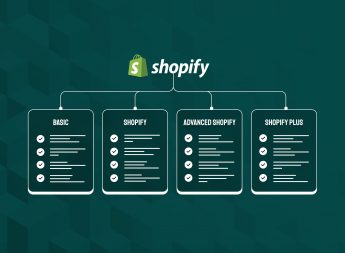Plan for ecommerce success with better project outlines

How is your ecommerce site currently performing? Is it as well as you hoped?
Perhaps your Shopify’s a shambles or your Magento’s in a muddle.
Whatever situation you face, you sometimes have to wipe the slate clean and start over again. If you’re not happy with your current site and are looking to rework it or even begin a whole new project, make sure you plan your new site using an ecommerce project outline.
Why?
ecommerce is hard to get right. A survey from 2019 indicates that as many as 90% of ecommerce startups fail. For an ecommerce project to succeed, lots of small things need to be done correctly and in the right order.
These two aims are possible if you follow a well-constructed project outline.
Starting a site refresh or new venture with a project outline could make the difference between success and failure, too―studies show that project planning phases are an important contributor to overall success.
This article covers what an ecommerce project outline is, why they are beneficial, and how you can create your own.
Let’s get started.
What is an ecommerce Project Outline?
An ecommerce project outline is a start-to-finish framework you’ll use to create an ecommerce website.
Much like the Architect’s blueprint, it has all the information needed to organize, construct, and launch your online store.
You can separate your project into logical phases to complete tasks in the right order and organize all the resources you need.
Abraham Lincoln famously said ‘give me six hours to chop down a tree and I will spend the first four sharpening the axe.” Lincoln knew about the benefits of spending time on preparation.
Typical items found in an ecommerce project outline include―
- Well-defined aims and goals.
- The IT resources you’ll need.
- The people who’ll do the work.
- Wireframes for crucial site sections.
- Expected project duration.
- Deadlines and milestones along the way.
- Anticipated budgets.
Now, let’s take a look at the benefits of using a project outline.
What are the benefits of using an ecommerce project outline?
Let’s cut to the chase.
You want to deliver the latest iteration of your ecommerce website on-budget, on-time, and with it functioning as you planned.
Creating an ecommerce project outline at the outset enables you to set benchmarks, quantify progress, and see the way forward.
It’s like a marathon runner studying the map of the course before the race. Yes, she already knows exactly how long the course is and the time goal she wants to beat ― but having a map to study provides more guidance.
She’ll know where the hilly stages are, where she can take on water, and if there are any changes in the surface she’ll be running on. In short, she can plan for problems.
If you fail to plan your next ecommerce project, then you can face many of the typical problems of poorly planned projects―
Feature creep. Have a written plan can help prevent issues with feature creep. Without a pre-agreed plan, key stakeholders can try to add in new features on a whim. Project leaders can use a written outline to support arguments to stay on track with the original vision.
Over-complication. If you understand before you start how everything in your ecommerce site will fit together, it prevents you from having to devise a workaround to unforeseen problems on-the-fly. You can select plugins and integrations that play nice with each other from the outset.
Missing elements. Without a plan, you can reach the end of your ecommerce project only to find out that you have missed a vital component for site operation.
Using an ecommerce project outline allows you to anticipate difficulties. Time spent in critical thinking about the project’s requirements will enable you to see potential roadblocks and bottlenecks―and formulate plans to deal with them.
OK, now let’s take a look at how you put an ecommerce project together.
How do you write an outline for an ecommerce project?
Writing an outline for an ecommerce project begins with a data-gathering phase. At Vsourz, we recommend that you take a strategic approach to data collection. If you use a recognized framework, you more likely to cover all scenarios.
But what framework should you use?
Journalists have long been taught the 5W system―who, what, when, where, and why (with occasionally ‘how’ in the mix). The 5Ws trace back to the ancient Greeks, who developed the system as a logical framework for getting to the core of any subject.
The benefit of using a formal system for data gathering is that it forces you to think through every step and angle. So, the first activity you might do for your next ecommerce project is to call a meeting with key stakeholders to brainstorm project questions using the 5W methodology.
Use the following examples to help prompt the sort of questions you should be asking―
Who questions for ecommerce projects.
Who are our competitors?
Understanding the competition provides a reference point for calibrating your success. It can also help to inform you about customer targeting and demographics.
Who are our best prospects?
Understanding your ideal shopper’s characteristics, such as what they think and the kind of content they like, will help you design your store for the best possible chance of converting traffic into sales.
What questions for ecommerce projects.
What payment methods will you accept?
The popularity of payment methods differs around the world. Globally, the credit card is king, but digital payment systems are more frequently used in some locations. And if you have a presence in Eastern-Europe, the Middle-East, or Africa, then cash-on-delivery is preferred.
What ecommerce channels will we sell on?
Multi-channel shoppers spend as much as three times more than single-channel shoppers, so it’s recommended you approach your ecommerce project with an omnichannel strategy.
When questions for ecommerce projects.
When is the go-live date?
Having a firm deadline helps concentrate minds on the task at hand, but think about your deadlines in depth. The Planning Fallacy is a concept that illustrates just how bad humans are at predicting the time needed to complete work. It turns out; we often don’t account for any problems that might arise in a compound series of tasks, so add in a time buffer for unforeseen events.
When will the significant milestones be due?
Milestones help to split an enormous task into smaller, more achievable chunks. They provide a point where you can take stock of progress, test features, and check on budgets.
Where questions for ecommerce projects.
Where shall we host our site?
Every ecommerce website needs a place to call home, and there are myriad hosting solutions for you to choose from. The platform you decide to build your site on will also play a role in the type of hosting you need. Whichever one you choose, make sure it is well secured to prevent external hacks and even consider a service like Cloudflare to prevent DDOS attacks.
Where are my customers?
Globally, online shoppers shop 57% of the time outside their home country borders. It’s only the US and Canada where this isn’t the case. If you expect to attract shoppers from other countries, you will want to consider making the text on your site available in more than one language.
Why questions for ecommerce projects.
Why are we choosing to do this project right now?
Sometimes other priorities are more pressing than a ‘vanity’ project you would prefer to do instead. Take time to consider if your ecommerce project is the one that will push your overall business goals forward.
Why have we chosen to build our ecommerce site on ‘X’ platform?
Platform choice is fundamental, but there are seemingly a limitless number of options for you to choose from. All platforms have their strengths and weaknesses, and you shouldn’t select one over the other just because a competitor uses it. Speak to ecommerce experts who can advise you on the best ecommerce platform for your circumstances.
Once you have gone through these and other questions, organize your collected data and draw up your project outline. Construct task lists for each step, then allocate the work out to your team. You can track progress on your outline as you go along.
‘It sounds like a lot of work,’ I hear you say?
At Vsourz, we do this kind of work every day. We’re experts at delivering successful ecommerce projects (if we say so ourselves!), and we can help you outline and execute your next ecommerce project.
How Vsourz can help you with your next ecommerce project.
The Nasdaq predicts that by 2040 95% of all purchases will be facilitated through ecommerce. The COVID Pandemic has likely accelerated this transfer too, so if you don’t have a detailed ecommerce strategy in place right now, your business could be in danger.
It’s a digital land-grab out there; the businesses that establish themselves online in the next few years will become the ecommerce giants of the future.
Don’t leave your success to chance. Vsourz has delivered over 2000 ecommerce projects. Every day we help companies plan, develop, and launch successful ecommerce ventures. Take a look at our portfolio to see the kind of work we can produce.
Vsourz can provide you with simple, honest, no-fuss technology solutions that deliver your business’s goals.
Contact us today to chat about your ecommerce needs.






